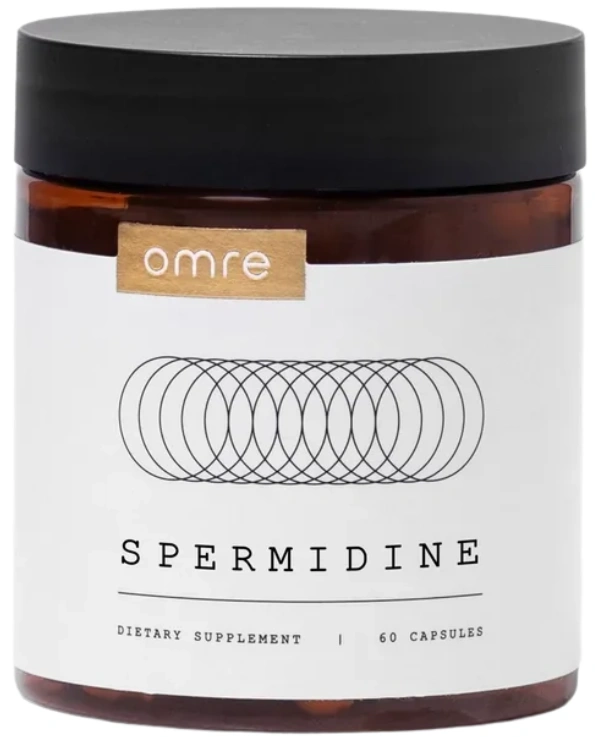Table of Contents
Spermidine is a natural compound that may support healthy aging by promoting cell renewal, reducing inflammation, and protecting your body from everyday damage.
Research into spermidine’s benefits is still emerging, but early studies suggest it may play a valuable role in longevity and immune health.
In this article, we’ll explore what spermidine is, how it works in the body, and what science currently says about its potential health benefits.
Cellular autophagy activator, providing a potent and highly purified dose of Spermidine.*SPERMIDINE
What Is Spermidine?
-v1745182993966.webp) Spermidine is a natural polyamine found in many foods that helps support cell growth and cellular health by promoting a process called autophagy. This process allows your cells to clean out old or damaged components, which is important for staying healthy as you age.
Spermidine is a natural polyamine found in many foods that helps support cell growth and cellular health by promoting a process called autophagy. This process allows your cells to clean out old or damaged components, which is important for staying healthy as you age.
Your body produces spermidine on its own, and it’s also made by certain gut bacteria. You can find it in everyday foods like wheat germ, soybeans, mushrooms, and aged cheese.
Researchers are especially interested in spermidine because it appears to influence how well cells repair themselves and how long they stay healthy.
As we grow older, our natural spermidine levels tend to decrease. That’s one reason why scientists believe increasing spermidine, through diet or supplements, might help support better aging, brain health, and even cardiovascular function.
While most research so far has been done in animals or lab models, results have been encouraging enough to spark interest in human studies.
How Does Spermidine Work?
Spermidine supports health in several ways, but one of the most important is how it affects our cells. It helps the body clear out waste, manage inflammation, and protect against daily wear and tear—all of which are linked to aging and long-term health.
Let’s take a closer look at the main ways spermidine may work in the body, based on what current research shows.
Promotes Cellular Renewal Through Autophagy
Autophagy is your body’s built-in recycling system. It allows cells to remove damaged parts and reuse the materials for new functions. This process is essential for keeping cells working properly over time.
Spermidine has been shown in multiple studies to activate autophagy, one of the key mechanisms of spermidine believed to support longevity and cellular renewal.
For example, a well-known study published in Nature Cell Biology found that spermidine helped extend the lifespan of yeast, worms, and flies by promoting this cellular cleanup process (1).
Another study showed that mice given spermidine had improved resistance to oxidative stress and signs of better cell maintenance (2).
Researchers believe this may explain why spermidine is often discussed in the context of healthy aging. While we need more human data, these findings suggest spermidine might help cells stay youthful for longer.
Helps Reduce Chronic Inflammation
Inflammation is a normal part of your body’s defense system, but when it becomes long-term or chronic, it can lead to problems such as joint pain, heart disease, or even premature aging.
Several animal and cell-based studies have found that spermidine may help reduce certain inflammation markers.
One study published in Cell Reports showed that spermidine supplementation reduced inflammatory signals in immune cells (3).
Another study using zebrafish and macrophage models found that spermidine helped lower oxidative stress and reduce levels of pro-inflammatory proteins (4).
These effects may be especially important as we age, since chronic low-grade inflammation (sometimes called "inflammaging") is commonly linked to age-related conditions.
Protects DNA From Oxidative Stress
Oxidative stress happens when your body has more harmful free radicals than it can handle. Over time, this stress can damage DNA, proteins, and other important structures in your cells.
Spermidine may help in two ways: first, by scavenging reactive oxygen species, and second, by activating genes involved in DNA repair to support health at the cellular level.
A study published in The Journal of Gerontology reported that spermidine helped reduce DNA damage in aging cells and supported overall genomic stability (5).
This protective effect could be one reason why the natural polyamine spermidine is being studied for its potential benefits in reducing age-related diseases like liver fibrosis and supporting longevity.
Supports a Balanced Immune Response
As we age, the immune system can become less efficient and sometimes overactive. This imbalance can increase the risk of infections or lead to autoimmune issues where the body mistakenly attacks itself.
Research suggests spermidine may help maintain a healthier immune balance. For instance, a study published in Nature Communications found that spermidine improved immune response and stress resistance in a common research model (C. elegans) (6).
Another 2019 study in Aging Cell showed that certain longevity-related pathways, like insulin signaling, are linked with spermidine metabolism and immune regulation (7).
While this area of research is still developing, these findings suggest spermidine may help support immune resilience, particularly in older adults.
Potential Health Benefits of Spermidine
-v1745183488205.webp) So far, the research on spermidine is promising. Most of what we know comes from lab and animal studies, which show encouraging results in areas like aging, heart health, and brain function. That said, more high-quality human research will be needed to fully understand how spermidine works in the body and who may benefit most.
So far, the research on spermidine is promising. Most of what we know comes from lab and animal studies, which show encouraging results in areas like aging, heart health, and brain function. That said, more high-quality human research will be needed to fully understand how spermidine works in the body and who may benefit most.
Below are some of the potential health benefits of spermidine that have been explored in scientific studies.
1. May Promote Longevity by Supporting Autophagy
Autophagy is the body’s way of clearing out damaged cells and recycling parts to make new ones. This process tends to slow down with age, and when it does, cellular damage can build up.
Several animal studies have found that spermidine can stimulate autophagy. For example, one study showed that spermidine supplementation extended the lifespan of yeast, worms, and flies (8).
Researchers believe that by helping cells “clean house,” spermidine may support overall cellular health and promote healthy aging.
2. May Help Reduce Chronic Inflammation
Inflammation is the body’s natural response to injury or illness, but when it sticks around too long, it can contribute to age-related diseases like arthritis, heart disease, and even cognitive decline.
Spermidine has been shown to reduce inflammatory markers in lab models. In one 2018 study, researchers observed that spermidine lowered inflammation levels in immune cells and zebrafish (9).
Another mouse study found that boosting spermidine levels through arginine supplementation was linked to reduced inflammation (10).
These early results are promising, but more research is needed to understand how spermidine intake may influence chronic inflammation and support long-term health at the cellular level.
3. May Protect Against Oxidative Stress
Oxidative stress occurs when there’s an imbalance between free radicals and antioxidants in the body. Over time, this stress can damage DNA, proteins, and cell membranes.
Some studies suggest spermidine may help neutralize free radicals and support the body’s natural repair processes.
In lab settings, spermidine has been shown to reduce DNA damage and promote cellular resilience in oxidative environments—factors that are often tied to aging and disease (11).
4. May Support Heart Health
Spermidine has gained attention for its potential role in supporting cardiovascular health. In a mouse study, researchers found that animals given spermidine had lower blood pressure and improved heart function (12).
These effects may be due to spermidine’s ability to improve the flexibility of blood vessels and support the endothelium, the thin layer of cells that lines the blood vessels.
This is important because a healthy endothelium helps maintain normal blood flow and reduces the risk of plaque buildup.
While human data is still limited, early findings suggest spermidine may play a supportive role in maintaining heart health and reducing the risk of cardiovascular disease as we age.
5. May Support Brain Health and Cognitive Function
Spermidine has been studied for its potential to protect the brain and support memory, especially in older adults.
Some early studies suggest that spermidine may help promote autophagy in brain cells, reduce reactive oxygen species, and support healthy mitochondrial function and neuron activity (13).
One small human study did not show significant cognitive improvements, possibly due to a low dosage. However, another trial found positive effects on memory performance in older adults.
These mixed results highlight the need for further research, especially in understanding which doses and durations may be most effective.
6. May Play a Role in Blood Sugar Regulation
Maintaining balanced blood sugar levels is key for energy, metabolism, and long-term health. In animal models, spermidine has been shown to improve insulin sensitivity and glucose metabolism.
For example, a study in mice found that spermidine improved glucose tolerance, meaning the body was better able to manage sugar in the blood (14).
While this is promising, it's not yet clear how spermidine affects blood sugar control in humans, so more research is needed.
SPERMIDINE
Cellular autophagy activator, providing a potent and highly purified dose of Spermidine.*
7. May Support Bone Health
As we age, our bones naturally lose density, which can lead to a higher risk of fractures and conditions like osteoporosis.
Some early animal studies suggest that spermidine may support bone health by promoting the activity of cells that build bone and slowing down the process of bone breakdown (15).
A study in aged mice found that dietary spermidine supplementation improved bone mineral density, though these findings still need to be confirmed in human trials (16).
8. May Play a Role in Reproductive Health
Spermidine has also been studied in the context of fertility, particularly sperm health in males.
In one lab-based study, spermidine supplementation improved sperm motility and overall viability, which are key factors for male fertility (17).
While the early data is encouraging, these findings were based on laboratory experiments, and more studies are needed to understand its real-world effects.
There is also some early evidence that spermidine might play a role in female reproductive health. One mouse study found that changes in spermidine metabolism affected ovarian function, but this area of research is still developing (18).
9. May Support Healthy Fat Metabolism
Fat metabolism plays a key role in energy balance and maintaining a healthy weight. Disruptions in this process can lead to obesity and related conditions like type 2 diabetes.
A 2015 mouse study found that spermidine helped enhance fat metabolism by boosting the activity of an enzyme involved in fat breakdown (19).
Mice on a high-fat diet who received spermidine showed better glucose regulation and less weight gain.
While this research is interesting, it’s too early to say whether spermidine could have the same effects in people.
10. Might Offer Protective Effects Against Certain Cancers
Some studies have explored whether spermidine could help slow or prevent cancer development, mainly by supporting autophagy and reducing cellular stress.
For example, research published in Molecular Cancer suggested that autophagy—the process supported by spermidine—may help suppress tumor growth in early stages (20).
Another study noted that spermidine’s effects may mimic those of fasting, which has shown some promise in reducing cancer risk in lab models (21).
That said, this is a complex area, and much more research is needed before any conclusions can be drawn. Currently, there is no strong evidence to recommend spermidine as a cancer-preventive supplement.
How to Increase Spermidine Naturally
If you’re looking to boost your spermidine levels, there are a few natural ways to do it. You can get it through spermidine-rich foods, supplements, and by supporting a healthy gut.
Eat More Spermidine-Rich Foods
Many everyday foods contain spermidine, especially plant-based options. Including a variety of these in your diet can help support your body’s natural spermidine levels.
Top food sources of spermidine include:
Wheat germ – one of the highest dietary sources
Soy products – including soybeans, tofu, and natto
Aged cheese – such as cheddar, brie, and blue cheese
Mushrooms – especially shiitake and maitake varieties
Legumes – like lentils, chickpeas, and green peas
Whole grains – including oats, brown rice, and whole wheat bread
Nuts and seeds – such as almonds, sunflower seeds, and sesame
Fruits and vegetables – including apples, cauliflower, broccoli, and mango
Chicken liver and other organ meats
Seafood – such as mackerel, squid, and shellfish
A balanced, varied diet that includes these foods can contribute to overall health and support natural spermidine production.
Consider Spermidine Supplements
If you’re not getting enough spermidine from food—or if you're aiming for a more targeted dose—supplements can be a convenient option.
These supplements are often made from concentrated wheat germ extract or other natural sources and come in capsule or powder form.
Most spermidine supplements are designed to deliver a standardized daily amount, often between 1–6 mg. While there’s no official daily requirement yet, this is the range used in many research studies.
Supplements may be especially helpful for older adults, as spermidine levels tend to decline with age. However, it’s always a good idea to speak with a healthcare provider before starting any new supplement.
One option you might consider is Omre Spermidine, which offers a highly concentrated dose sourced from natural ingredients. It’s formulated to support autophagy and overall cellular health, and can be a convenient way to help fill potential gaps in your diet.
Side Effects of Spermidine and Safety Considerations
Spermidine is generally considered safe when taken at appropriate doses, but like any supplement, it may not be suitable for everyone. Most people tolerate it well, but mild side effects can occasionally occur.
Some users report digestive discomfort, such as gas or bloating, when first starting spermidine supplements. This is usually temporary and may improve as your body adjusts. Starting with a lower dose and gradually increasing it may help minimize these effects.
There is limited data on how spermidine interacts with medications. If you're taking medication for blood pressure, immune conditions, or other chronic illnesses, it's best to check with your doctor before adding spermidine to your routine.
In particular, individuals on immunosuppressive therapies should use caution, as spermidine may influence immune cell activity.
Spermidine supplements made from wheat germ may contain trace amounts of gluten. For those with celiac disease or gluten sensitivity, it's important to choose a gluten-free labeled version.
So far, no serious adverse effects have been reported in studies, but research in humans is still limited. Until more is known, it’s best to use spermidine supplements under medical guidance—especially if you are pregnant, breastfeeding, or managing a health condition.
Is Spermidine Worth Taking?
Spermidine shows a lot of promise for supporting healthy aging, but more research is still needed before we can say for sure how effective it is in humans.
That said, early studies have linked spermidine to benefits like better cellular function, improved heart health, and cognitive support, especially as we age.
If you’re someone interested in natural ways to support longevity or overall wellness, spermidine could be worth considering as part of a broader routine that includes a balanced diet, exercise, and good sleep. It's not a quick fix, but it may play a supporting role in long-term health.
The fact that our spermidine levels naturally decline with age makes supplementation a practical option for some people, especially those who may not get enough from food alone.
As always, it’s best to check with a healthcare provider if you’re unsure whether it’s right for you.
Ultimately, while the science is still catching up, the early evidence and safety profile make spermidine a compelling option for people focused on healthy aging.
Conclusion
Spermidine is a naturally occurring compound that may support healthy aging by promoting autophagy, reducing inflammation, and protecting cells from stress.
While most of the research so far comes from animal studies and lab models, the early results are promising and have sparked growing interest in the health and wellness world.
From supporting brain and heart health to its possible role in bone strength and metabolism, spermidine could offer a wide range of benefits.
If you're considering adding it to your wellness routine, talk to a healthcare provider, especially if you have underlying health conditions or take medication.
If you're looking for a clean and concentrated way to add spermidine to your daily routine, Omre Spermidine offers a convenient supplement made from natural sources.
You can check availability to see if it’s the right fit for you.
FAQs
What does spermidine do in the body?
Spermidine helps support cell renewal through a process called autophagy, where your cells clean out old or damaged parts. It also plays roles in DNA protection, immune balance, and overall cellular health.
Is spermidine anti-aging?
While it’s too early to say definitively, spermidine has been linked to processes that may slow aspects of aging, such as reducing inflammation and promoting cellular renewal. It’s often described as a potential anti-aging compound based on animal and lab studies.
Is spermidine FDA-approved?
No, spermidine is not FDA-approved to treat or prevent any disease. However, it is available as a dietary supplement in many countries, including the U.S.
How fast do you see effects?
Results can vary. Some users may feel subtle improvements in energy or focus within weeks, but many of the benefits linked to spermidine, like cellular repair and longevity, are long-term processes.
Can spermidine improve skin or hair health?
There’s no strong evidence yet, but since spermidine supports cellular function and reduces oxidative stress, some believe it may indirectly benefit skin and hair. More targeted research is needed in this area.





